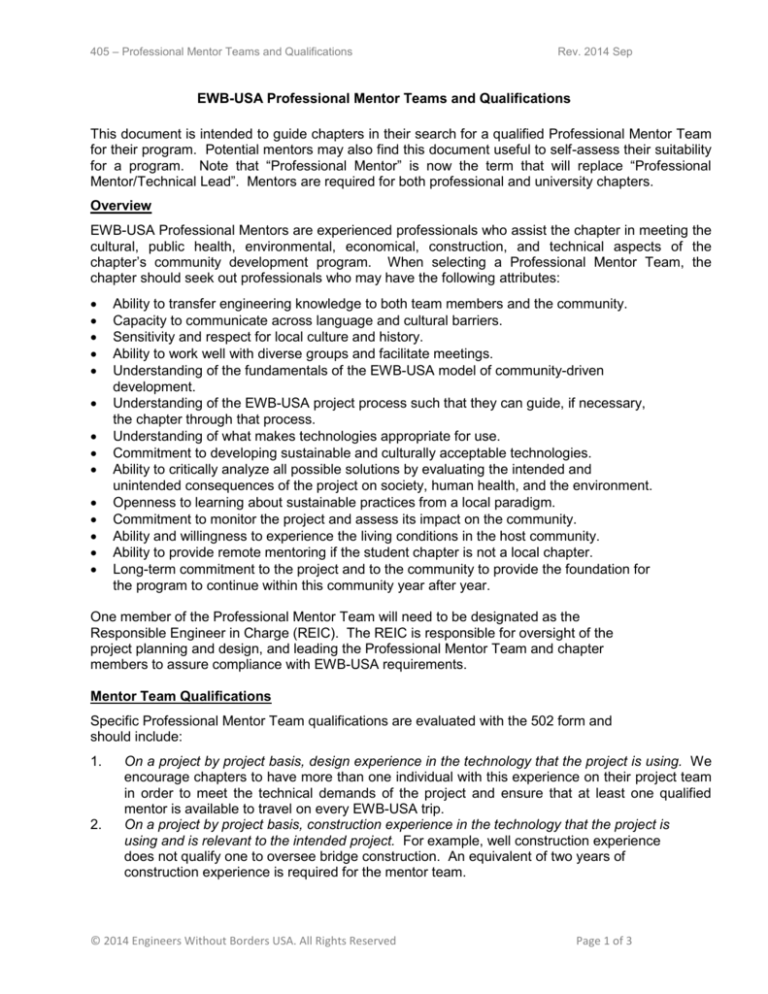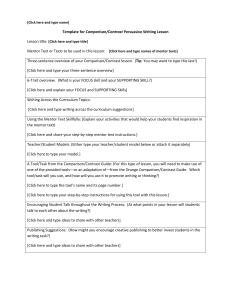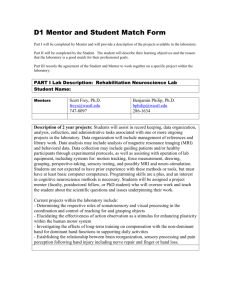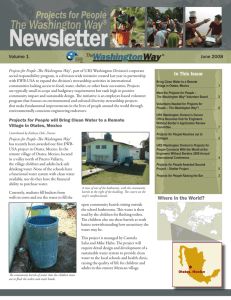
405 – Professional Mentor Teams and Qualifications
Rev. 2014 Sep
EWB-USA Professional Mentor Teams and Qualifications
This document is intended to guide chapters in their search for a qualified Professional Mentor Team
for their program. Potential mentors may also find this document useful to self-assess their suitability
for a program. Note that “Professional Mentor” is now the term that will replace “Professional
Mentor/Technical Lead”. Mentors are required for both professional and university chapters.
Overview
EWB-USA Professional Mentors are experienced professionals who assist the chapter in meeting the
cultural, public health, environmental, economical, construction, and technical aspects of the
chapter’s community development program. When selecting a Professional Mentor Team, the
chapter should seek out professionals who may have the following attributes:
Ability to transfer engineering knowledge to both team members and the community.
Capacity to communicate across language and cultural barriers.
Sensitivity and respect for local culture and history.
Ability to work well with diverse groups and facilitate meetings.
Understanding of the fundamentals of the EWB-USA model of community-driven
development.
Understanding of the EWB-USA project process such that they can guide, if necessary,
the chapter through that process.
Understanding of what makes technologies appropriate for use.
Commitment to developing sustainable and culturally acceptable technologies.
Ability to critically analyze all possible solutions by evaluating the intended and
unintended consequences of the project on society, human health, and the environment.
Openness to learning about sustainable practices from a local paradigm.
Commitment to monitor the project and assess its impact on the community.
Ability and willingness to experience the living conditions in the host community.
Ability to provide remote mentoring if the student chapter is not a local chapter.
Long-term commitment to the project and to the community to provide the foundation for
the program to continue within this community year after year.
One member of the Professional Mentor Team will need to be designated as the
Responsible Engineer in Charge (REIC). The REIC is responsible for oversight of the
project planning and design, and leading the Professional Mentor Team and chapter
members to assure compliance with EWB-USA requirements.
Mentor Team Qualifications
Specific Professional Mentor Team qualifications are evaluated with the 502 form and
should include:
1.
2.
On a project by project basis, design experience in the technology that the project is using. We
encourage chapters to have more than one individual with this experience on their project team
in order to meet the technical demands of the project and ensure that at least one qualified
mentor is available to travel on every EWB-USA trip.
On a project by project basis, construction experience in the technology that the project is
using and is relevant to the intended project. For example, well construction experience
does not qualify one to oversee bridge construction. An equivalent of two years of
construction experience is required for the mentor team.
© 2014 Engineers Without Borders USA. All Rights Reserved
Page 1 of 3
405 – Professional Mentor Teams and Qualifications
3.
Rev. 2014 Sep
International development qualifications vary and must be relevant to the work EWB-USA
does. For instance, simply visiting abroad does not qualify one as an international
development expert. Examples of international development experience could include:
previous EWB-USA experience or completing international development-type work with a
different organization (Peace Corps, mission, etc.). An equivalent of two full-time years of
international development experience is required, with at least 3 months of in-country
work.
As an example, a school design and construction project may have a Mentor Team which
includes:
a. an individual with international development and cultural experience
b. an individual who has been involved with projects within this Program for the past three
years
c. individuals who have the specific design and construction experience necessary for a
school building (this may not be the same individual if the Chapter had previously
constructed a project type of a different technology)
Responsible Engineer in Charge (REIC) Qualifications
On a project by project basis, each project team will designate a Responsible Engineer in
Charge (REIC) who will take the ultimate responsibility for the project. The REIC may travel
on assessment, implementation, and monitoring trips, providing technical guidance on the
designs, ensuring all reports are submitted to EWB-USA on time, and providing interim
internal review and approval of final designs (with signature and date). The REIC may
designate an alternative Professional Mentor to travel on their behalf.
The technical qualifications required of a Responsible Engineer in Charge (REIC) vary depending on
the project level of the intended project. Project levels are based on the potential impact of failure and
the following table specifies the qualifications for project levels. Please note: not every person on the
mentor team has to meet the qualifications listed in the table below. The REIC, as well as the
traveling mentor, if the REIC is not traveling, have to meet these qualifications, but other mentors are
welcome to assist the chapter. This gives a place for younger professionals and non-engineers to
join the project in a meaningful way.
PROJECT
LEVEL
IMPACT OF
FAILURE
Level 1
Failure of the project
may result in death,
severe illness, injury,
or significant damage
of property.
Level 2
Failure of the project
would not result in
death, severe illness,
or injury. However,
some damage to
property is possible.
REQUIRED RESPONSIBLE
ENGINEER IN CHARGE
QUALIFICATIONS
Licensed Engineer with at least 7 years of
direct experience (post bachelor’s degree)
in design and construction of infrastructure
similar to that proposed in the project.
Each mentor is subject to approval by
EWB-USA Project Engineers.
Professional with at least 5 years of direct
professional experience (post bachelor’s
degree) in design and construction of
infrastructure similar to that proposed in
the project. Each mentor is subject to
approval by EWB-USA Project Engineers.
© 2014 Engineers Without Borders USA. All Rights Reserved
EXAMPLES
Most construction
projects including
buildings and
bridges and largescale water projects.
Water supply, water
treatment, sanitation,
and energy projects.
Page 2 of 3
405 – Professional Mentor Teams and Qualifications
Level 3
Failure of project
would not result in
significant damage
beyond limited
economic loss.
Rev. 2014 Sep
Professional with 3 years of direct
professional experience (post bachelor’s
degree) in design and construction of
infrastructure similar to that proposed in
the project. Each mentor is subject to
approval by EWB-USA Project Engineers.
Agriculture,
improved stoves,
computer systems,
and other similar
projects.
In addition to meeting the listed qualifications, a travelling Professional Mentor must be a
member of EWB-USA and part of an EWB-USA Chapter. They must attend the Professional
Mentor webinar. The Responsible Engineer in Charge should submit a 404 - Mentor Statement
of Intent and resume to the project team so that these documents are included with the team’s
trip submittals to EWB-USA Headquarters.
© 2014 Engineers Without Borders USA. All Rights Reserved
Page 3 of 3







